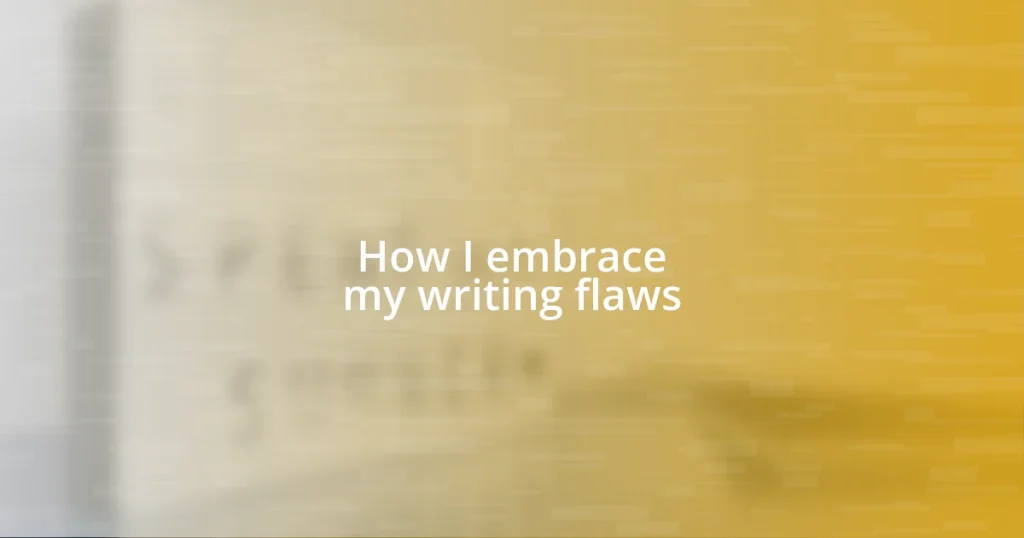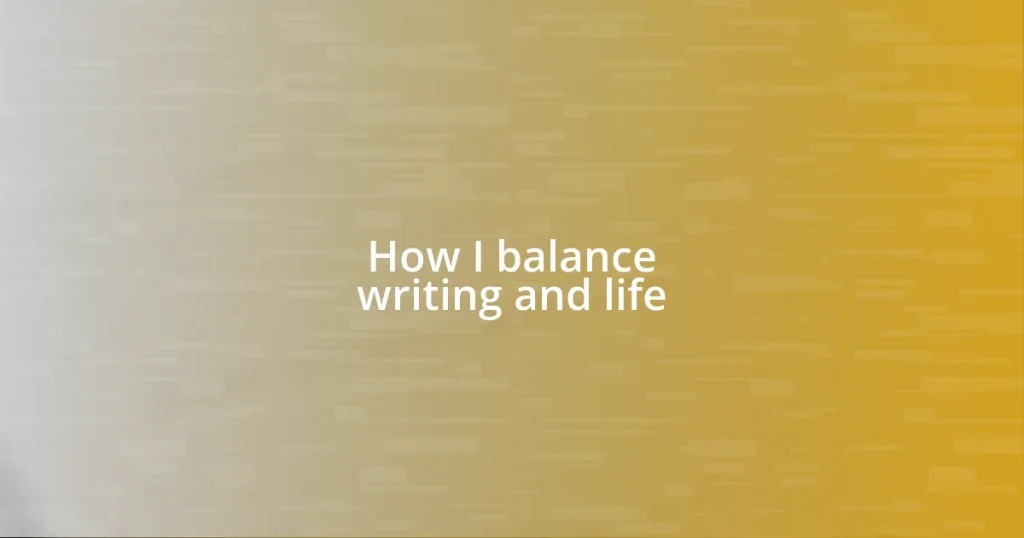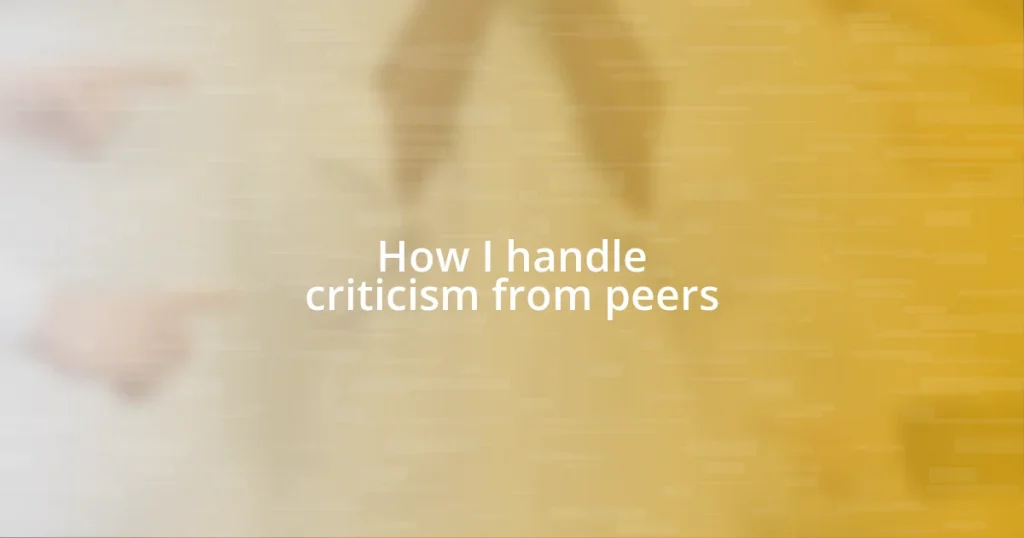Key takeaways:
- Overcoming perfectionism is crucial; striving for flawlessness may hinder creativity and authenticity in writing.
- Embracing imperfections fosters connection with readers and encourages personal growth through vulnerability and shared experiences.
- Seeking and valuing feedback enhances writing quality, broadens perspectives, and transforms writing into a collaborative journey.
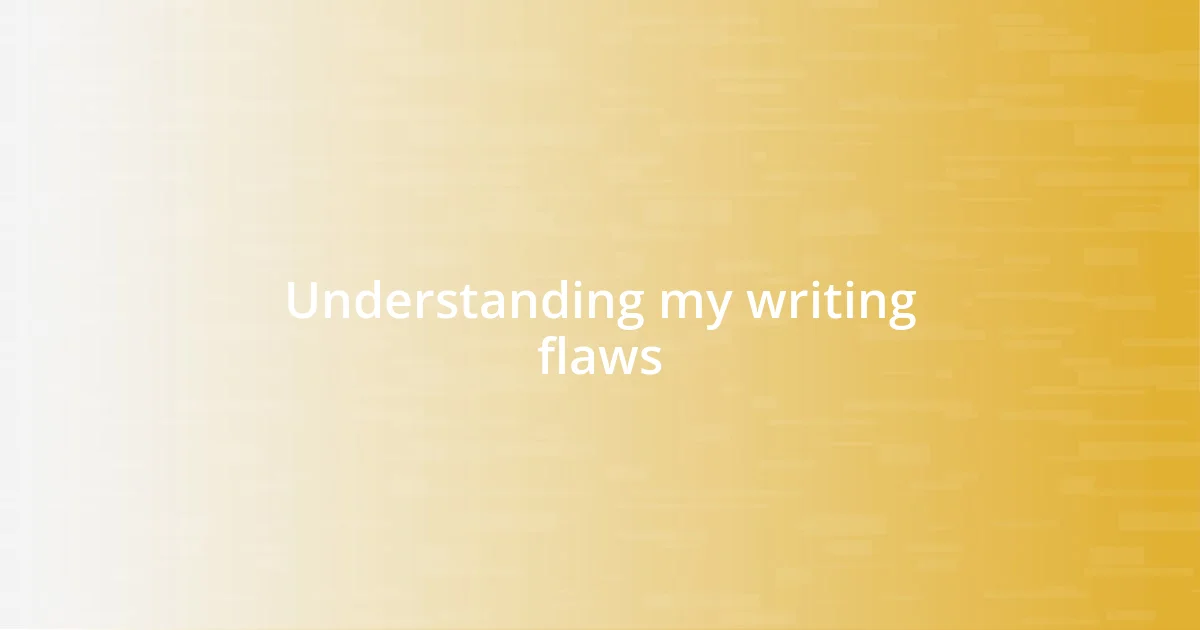
Understanding my writing flaws
When I take a step back to examine my writing, I often find that my greatest flaws stem from overthinking. There are moments when I can spend hours editing a single sentence, questioning if I’ve chosen the right words. Have you ever felt that nagging doubt creeping in while you write? It leads me to wonder if my perfectionism hinders my creativity.
One specific instance that stands out was during a personal blog post where I labored over every detail until I nearly gave up. I wrote, erased, and rewrote sections repeatedly, losing sight of my original voice. Looking back, I realize that striving for flawlessness can sometimes mute the authenticity that makes writing resonate with readers.
I’ve also noticed that I tend to rely heavily on jargon, thinking it makes me sound more knowledgeable. But does it really connect with my audience? This realization came after receiving feedback where readers expressed they felt lost in my technical terms. It’s a stark reminder that clarity often triumphs over complexity in communication.
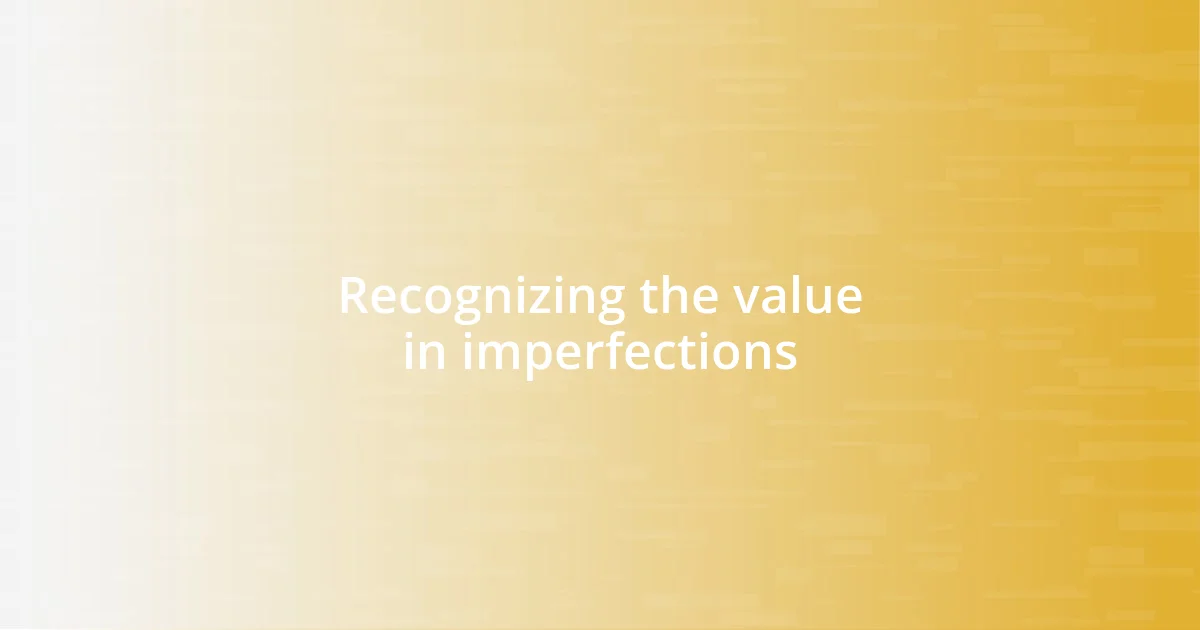
Recognizing the value in imperfections
Recognizing the value in imperfections offers a unique perspective in writing. I remember a time when I published a piece full of typos and awkward phrases, thinking it would be a disaster. Yet, to my surprise, readers connected with it on a deeper level, sharing their own stories of vulnerability and imperfection. It struck me that my perceived flaws became a bridge that invited others in.
Embracing imperfections has transformed my writing journey. Once, I received feedback that highlighted my tendency to over-complicate ideas. Initially, it felt disheartening, but I realized that those raw, unpolished thoughts carried a human touch. This authenticity not only resonated more with my audience but also encouraged me to write with freedom rather than fear of judgment.
The beauty of flaws lies in their ability to foster connection. Have you ever come across a heartfelt story riddled with mistakes but still found it moving? I’ve experienced that many times. In those moments, I understand that it’s the message and emotion that truly matter, allowing me to free myself from striving for unattainable perfection.
| Perfections | Imperfections |
|---|---|
| Clean and polished writing | Real and relatable expressions |
| Technical jargon | Simple and clear language |
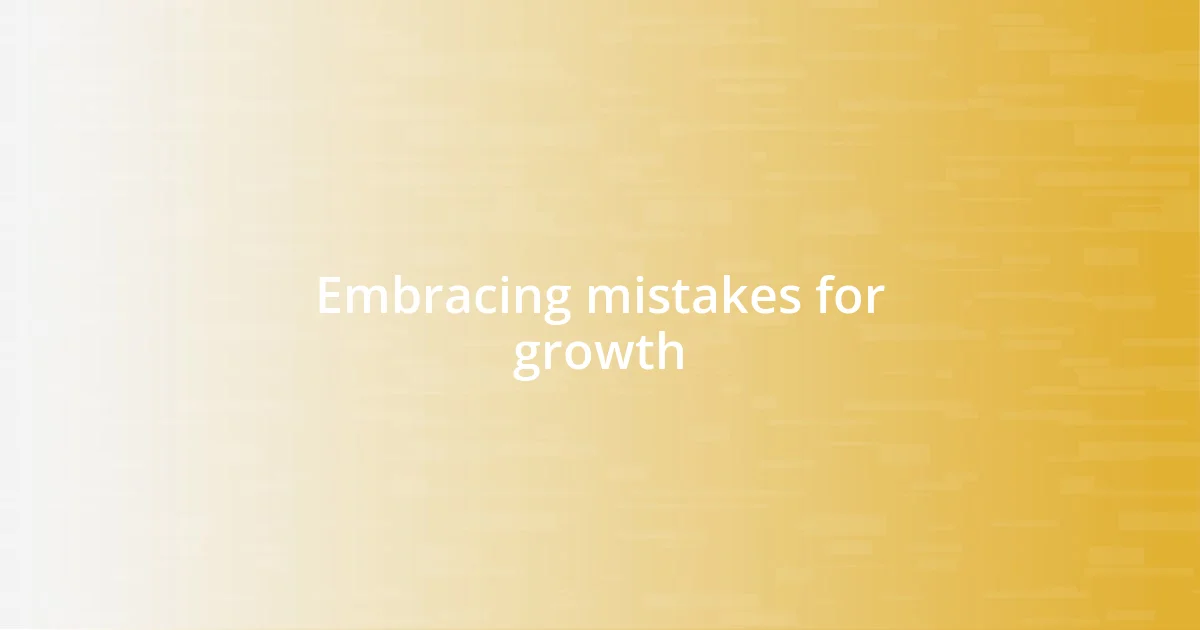
Embracing mistakes for growth
Embracing mistakes as part of the writing process truly fosters personal growth. I can recall a time during a writing workshop where I shared a draft that had glaring errors. I felt exposed and vulnerable, but the feedback I received transformed my mindset. Instead of feeling defeated, I found myself appreciating the constructive critique and recognizing that those mistakes provided valuable lessons. Watching others resonate with my struggles reinforced the notion that imperfections could cultivate a sense of community.
Here are a few insights I’ve gathered from embracing writing mistakes:
- Mistakes create discussion: They open doors for conversations that lead to deeper understanding.
- Flaws build resilience: Accepting my errors helps me develop a thicker skin, ultimately making me a more confident writer.
- Learning opportunities: Each mistake is a stepping stone, offering lessons that refine my craft over time.
- Encouraging vulnerability: Sharing my flaws has empowered others to do the same, fostering a supportive writing environment.
- Authenticity reigns: Readers often connect more with genuine voices, making flaws a key ingredient in building trust.
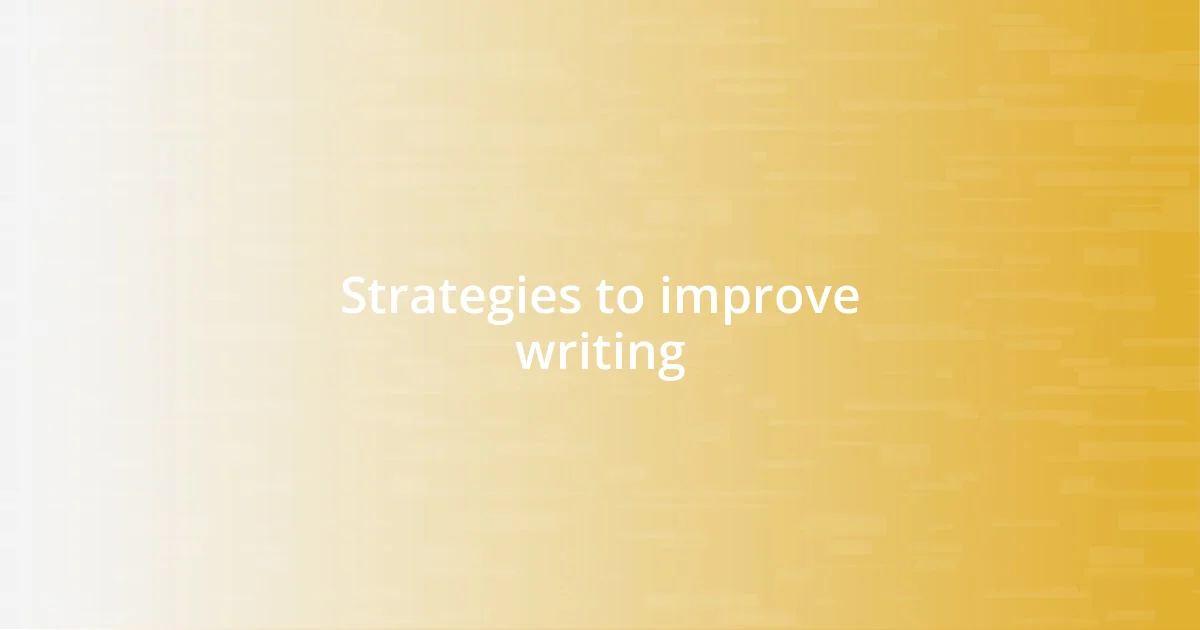
Strategies to improve writing
One of my go-to strategies for improving my writing is embracing the power of revision. I remember vividly when I first discovered the magic of stepping away from a draft. After giving myself a day or two, I returned to my work and found glaring errors I had overlooked. It was like viewing my writing with fresh eyes—suddenly, I could see areas that needed clarity or even a complete rewrite. This experience taught me that distilling your ideas can often lead to more impactful content.
Feedback is another critical strategy I’ve learned to value. The first time I shared my work with a trusted group of fellow writers, I felt a mix of excitement and terror. Their insights didn’t always match my vision, but each suggestion nudged my writing closer to the mark. I realized that constructive criticism is a gift, allowing me to expand my skills and deepen my understanding of my audience’s expectations. Have you ever had a moment when feedback completely changed your perspective? For me, it has become an essential part of the growth process.
Lastly, I can’t overstate the importance of reading widely. I try to immerse myself in various genres whenever I can. One day, I picked up a novel outside my usual preference, and it opened my eyes to new narrative styles and voices. This exposure not only sparks new ideas but also inspires me to experiment with my tone and structure. By seeking diverse writing, I continuously learn what resonates with me and what might connect with my readers, pushing me to evolve my writing every day.

Seeking feedback to enhance skills
Seeking feedback has been one of the most pivotal shifts in my writing journey. I remember a particularly nerve-wracking experience when I shared a piece with a local writers’ group. The air was thick with anticipation as I awaited their responses, but what struck me most was how their varied perspectives illuminated aspects of my writing I had never considered. It was like shining a flashlight in dark corners; their feedback not only offered clarity but also expanded my horizons.
When I actively seek out critique, I often remind myself that this process is fundamentally about growth. For instance, after submitting a story to an online platform, I braced myself for the feedback. A comment caught my eye: it praised my emotional depth but pointed out the need for tighter pacing. Initially, I felt a surge of defensiveness, yet I realized this insight could be the key to my evolving narrative style. How often do we cling to our vision without letting constructive criticism shape it? For me, it’s been a lesson in humility and an invitation to embrace improvement.
I’ve also found that creating a feedback loop with fellow writers fosters a sense of camaraderie. A few years ago, I formed a small writing group where we share drafts and notes regularly. One day, a friend pointed out an underlying theme in my work that I hadn’t consciously woven in. It was a lightbulb moment—who would have thought that my subconscious could lead the charge? Without that feedback, I might never have recognized a layer of my writing that resonates deeply with readers. Seeking feedback has transformed writing from a solitary experience into a collaborative journey. Have you tried harnessing the power of feedback in your own writing? I can’t recommend it enough.
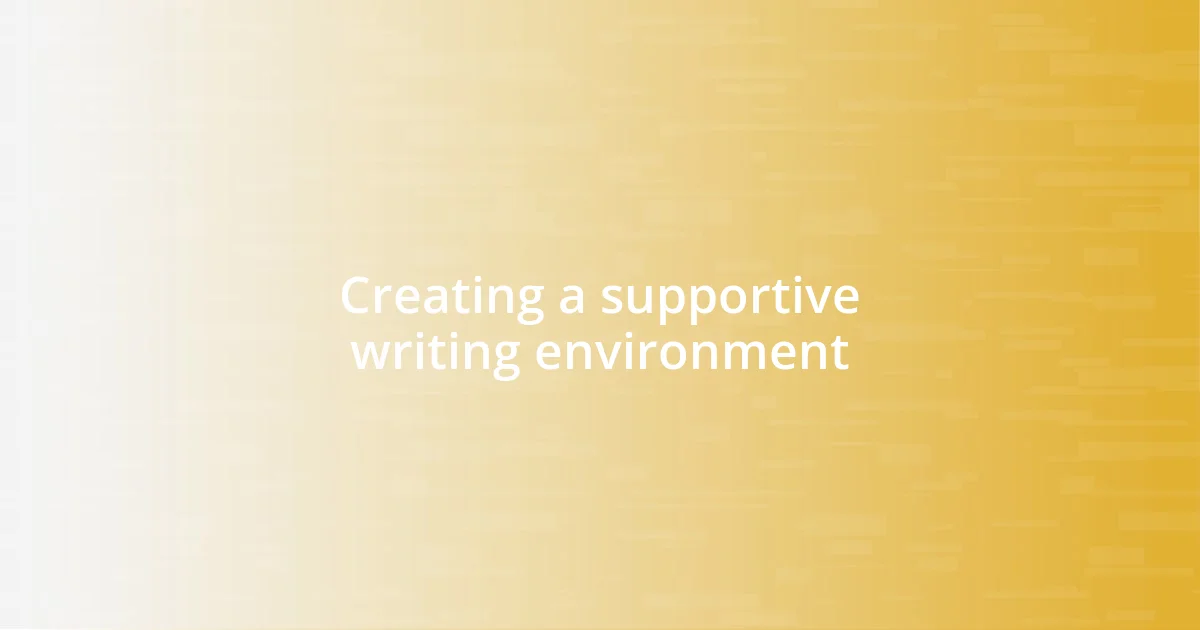
Creating a supportive writing environment
Creating a supportive writing environment has been essential for my growth. I recall setting up a dedicated writing space filled with things that inspire me—like my favorite books and art. It might sound simple, but being surrounded by my creative influences helps me sink into the flow of writing. Have you ever noticed how a physical space can shift your mental state? For me, it’s like finding my personal writing sanctuary.
Another component of this supportive environment is surrounding myself with encouraging voices. I often find myself gravitating towards community forums and social media groups focused on writing. The first time I posted a snippet of my work, I was nervous about how it would be received. But when the responses poured in, filled with positivity and encouragement, I felt a warm sense of belonging. It reinforced the idea that a community thrives when it uplifts one another, and it’s helped me embrace my writing flaws with newfound confidence.
Regular writing rituals can also foster that nurturing atmosphere. For instance, I’ve adopted a habit of journaling my reflections and uncertainties before diving into a new project. This practice not only clears my mind but also sets the stage for creativity. It’s almost like performing a little mental warm-up before the big game. Have you ever tried a writing ritual? Finding what works for you can make a world of difference in how you approach your craft.










